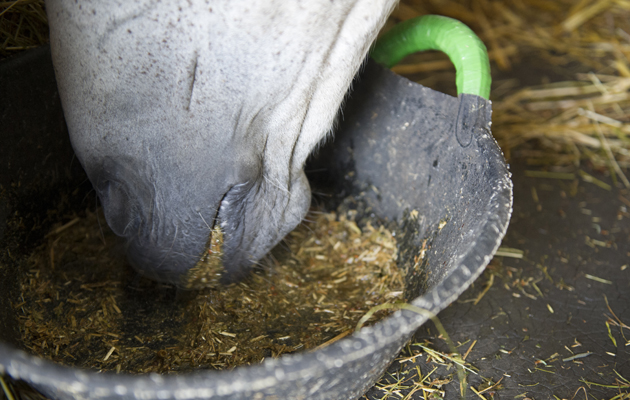THE equestrian industry must stay ahead of the game to keep its social licence to operate, to convince the public that the relationship between horses and humans is mutually beneficial.
This was the view expressed during an expert panel discussion at the 2020 virtual World Horse Welfare conference on 12 November.
{"content":"PHA+UGFuZWxsaXN0cyBDaHJpc3RhIExlc3TDqS1MYXNzZXJyZSwgU2hlaWxhIFZvYXMsIEFuZHJldyBNY0xlYW4gYW5kIENhcm9saW5lIE5va2VzIGRlYmF0ZWQgb24gdGhlIHRvcGljIG9mIHRoZSBjb25mZXJlbmNlOiB0aGUgaG9yc2UtaHVtYW4gcGFydG5lcnNoaXAg4oCTIHdoYXTigJlzIGluIGl0IGZvciB0aGUgaG9yc2U\/PC9wPgo8cD5Bc2tlZCBieSBkaXNjdXNzaW9uIGNoYWlybWFuIE1pa2UgQ2F0dGVybW9sZSwgYSByYWNpbmcgam91cm5hbGlzdCwgd2hhdCBhc3BlY3Qgb2YgdGhlIHBhcnRuZXJzaGlwIHRoZXkgdGhvdWdodCB3b3VsZCBiZSBjb25maW5lZCB0byBoaXN0b3J5IGluIDIwIHllYXJzLCBNciBNY0xlYW4gc2FpZCBoZSBmb3Jlc2VlcyBhIG51bWJlciBvZiBjaGFuZ2VzLjwvcD4KPHA+VGhlIGZvcm1lciB0b3AgZXZlbnRlciBhbmQgc2hvd2p1bXBlciwgbm93IGEgbWVtYmVyIG9mIHRoZSBSYWNpbmcgVmljdG9yaWEgd2VsZmFyZSBhZHZpc29yeSBib2FyZCBhbmQgZGlyZWN0b3Igb2YgPGEgaHJlZj0iaHR0cHM6Ly93d3cuaG9yc2VhbmRob3VuZC5jby51ay90YWcvcG9ueS1jbHViIj5Qb255IENsdWI8L2E+IEF1c3RyYWxpYSwgc2FpZCB0aGluZ3MgaGF2ZSBjaGFuZ2VkIGh1Z2VseSBpbiBoaXMgbGlmZXRpbWUuPC9wPgo8cD48ZGl2IGNsYXNzPSJhZC1jb250YWluZXIgYWQtY29udGFpbmVyLS1tb2JpbGUiPjxkaXYgaWQ9InBvc3QtaW5saW5lLTIiIGNsYXNzPSJpcGMtYWR2ZXJ0Ij48L2Rpdj48L2Rpdj48c2VjdGlvbiBpZD0iZW1iZWRfY29kZS0zMSIgY2xhc3M9ImhpZGRlbi1tZCBoaWRkZW4tbGcgcy1jb250YWluZXIgc3RpY2t5LWFuY2hvciBoaWRlLXdpZGdldC10aXRsZSB3aWRnZXRfZW1iZWRfY29kZSBwcmVtaXVtX2lubGluZV8yIj48c2VjdGlvbiBjbGFzcz0icy1jb250YWluZXIgbGlzdGluZy0tc2luZ2xlIGxpc3RpbmctLXNpbmdsZS1zaGFyZXRocm91Z2ggaW1hZ2UtYXNwZWN0LWxhbmRzY2FwZSBkZWZhdWx0IHNoYXJldGhyb3VnaC1hZCBzaGFyZXRocm91Z2gtYWQtaGlkZGVuIj4NCiAgPGRpdiBjbGFzcz0icy1jb250YWluZXJfX2lubmVyIj4NCiAgICA8dWw+DQogICAgICA8bGkgaWQ9Im5hdGl2ZS1jb250ZW50LW1vYmlsZSIgY2xhc3M9Imxpc3RpbmctaXRlbSI+DQogICAgICA8L2xpPg0KICAgIDwvdWw+DQogIDwvZGl2Pg0KPC9zZWN0aW9uPjwvc2VjdGlvbj48L3A+CjxwPuKAnFdl4oCZdmUgbW92ZWQgaW4gc3VjaCBhIHNob3J0IHRpbWUgZnJvbSBhIHBsYWNlIHdoZXJlIHRoZSBob3JzZSB3YXMgYW4gYW5pbWFsIHdlIGNvdWxkIHVzZSwgYW5kIGFsbCBvdXIgYXR0ZW50aW9uIHdhcyBvbiBrZWVwaW5nIGl0IGFsaXZlIGFuZCB3ZWxsLCB0byBsb29raW5nIGF0IHdoYXQgaXMgaW4gaXQgZm9yIHRoZSBob3JzZSzigJ0gaGUgc2FpZC48L3A+CjxwPuKAnEkgdGhpbmsgdGhpcyBpcyB3aGVyZSB3ZeKAmXJlIGdvaW5nLCBhbmQgdGhhdOKAmXMgYSB2ZXJ5IGdvb2QgdGhpbmcuIFRoZSBtb3JlIHdlIGtub3cgYWJvdXQgaG9yc2VzIGFzIHNlbnRpZW50IGJlaW5ncywgdGhlIG1vcmUgd2UgcmVjb2duaXNlIHRoZXJl4oCZcyBzbyBtdWNoIG1vcmUgdG8gdGhlbS7igJ08L3A+CjxwPk1yIE1jTGVhbiBzYWlkIGlmIHRoZSBpbmR1c3RyeSBpcyBhaGVhZCBvZiB0aGUgZ2FtZSwgcmFjaW5nIHdpbGwgc3RpbGwgZ28gYWhlYWQgaW4gMjA0MCwgYnV0IHdpdGhvdXQgd2hpcHMuIEhlIGFkZGVkIHRoYXQgaGUgaXMgbm90IGFnYWluc3Qgd2hpcCB1c2UsIGJ1dCBoZSBpcyBhZ2FpbnN0IHRoZSB1c2Ugb2YgYSB0b29sIHRvIHdoaWNoIHRoZSBhbmltYWwgY2Fubm90IHJlc3BvbmQsIHN1Y2ggYXMgd2hlbiBhIHJhY2Vob3JzZSBpcyBhbHJlYWR5IGdvaW5nIGFzIGZhc3QgYXMgcG9zc2libGUuPC9wPgo8ZGl2IGNsYXNzPSJhZC1jb250YWluZXIgYWQtY29udGFpbmVyLS1tb2JpbGUiPjxkaXYgaWQ9InBvc3QtaW5saW5lLTMiIGNsYXNzPSJpcGMtYWR2ZXJ0Ij48L2Rpdj48L2Rpdj4KPHA+SGUgYmVsaWV2ZXMgd2Ugd2lsbCBub3Qgc2VlIGN1cmIgYml0cyBvciBzcHVycyBiZWluZyB1c2VkLCB0aGF0IOKAnHRoZSB0aWdodCBub3NlYmFuZCB3aWxsIGJlIGEgZGVhZCBkdWNr4oCdLCBhbmQgdGhhdCB1bmRlcnN0YW5kaW5nIG9mIGhvcnNlc+KAmSBsZWFybmluZyB0aGVvcnkgd2lsbCBpbXByb3ZlLCBhZGRpbmc6IOKAnEkgbG9vayBmb3J3YXJkIHRvIHRoYXQgZGF5LuKAnTwvcD4KPHA+Q2hyaXN0YSBMZXN0w6ktTGFzc2VycmUsIGEgam91cm5hbGlzdCBzcGVjaWFsaXNpbmcgaW4gZXF1ZXN0cmlhbmlzbSBhbmQgcmVzZWFyY2gsIGJlbGlldmVzIG1hbmFnZW1lbnQgd2lsbCBjaGFuZ2UsIGFzIHBlb3BsZSB0aGluayBtb3JlIGVtcGF0aGV0aWNhbGx5IGFib3V0IHdoYXQgaG9yc2VzIHdhbnQgYW5kIG5lZWQsIGFuZCBtb3ZlIGF3YXkgZnJvbSBrZWVwaW5nIHRoZW0gc3RhYmxlZC48L3A+CjxkaXYgY2xhc3M9ImFkLWNvbnRhaW5lciBhZC1jb250YWluZXItLW1vYmlsZSI+PGRpdiBpZD0icG9zdC1pbmxpbmUtNCIgY2xhc3M9ImlwYy1hZHZlcnQiPjwvZGl2PjwvZGl2Pgo8cD5TY290bGFuZOKAmXMgY2hpZWYgdmV0IFNoZWlsYSBWb2FzIGFkZGVkOiDigJxJ4oCZZCBsaWtlIHRvIHNlZSB1cyB0cmVhdGluZyB0aGVtIGFzIGhvcnNlcywgYW5kIG5vdCBhbnRocm9wb21vcnBoaXNpbmcgcXVpdGUgYXMgbXVjaC48YnIgLz4K4oCcSSB3YW50IHRvIHNlZSBob3JzZXMgbGl2aW5nIHNvbWUgb2YgdGhlaXIgbGl2ZXMgb3V0c2lkZSwgZWF0aW5nIG5hdHVyYWwgZm9yYWdlIGFuZCB3aXRob3V0IHJ1Z3MgaW4gYWxsIHdlYXRoZXJzLCB3aXRoIGNvbXBhbmlvbnNoaXAuIExldOKAmXMgdHJlYXQgaG9yc2VzIGFzIGhvcnNlLCByYXRoZXIgdGhhbiBob3cgd2XigJlkIGxpa2UgdG8gYmUgdHJlYXRlZC7igJ08L3A+CjxwPkNvbmZlcmVuY2UgZ3Vlc3QgSmFzb24gQnJhdXRpZ2FtLCA8YSBocmVmPSJodHRwczovL3d3dy5ob3JzZWFuZGhvdW5kLmNvLnVrL2RyZXNzYWdlLWh1YiI+QnJpdGlzaCBEcmVzc2FnZTwvYT4gQ0VPLCBhc2tlZCB3aGV0aGVyIHRoZSBwYW5lbCB0aG91Z2h0IGhvcnNlIHNwb3J0IHdpbGwgc3RpbGwgaGF2ZSBwdWJsaWMgYXBwcm92YWwgYnkgdGhlIDIwNDAgT2x5bXBpY3MuPC9wPgo8ZGl2IGNsYXNzPSJhZC1jb250YWluZXIgYWQtY29udGFpbmVyLS1tb2JpbGUiPjxkaXYgaWQ9InBvc3QtaW5saW5lLTUiIGNsYXNzPSJpcGMtYWR2ZXJ0Ij48L2Rpdj48L2Rpdj4KPHA+4oCcSSB0aGluayB0aGlzIGlzc3VlIGlzIGRlZmluaXRlbHkgb24gdGhlIGNhcmRzLCBhbmQgdGhhdOKAmXMgd2h5IHdlIG5lZWQgdG8gYmUgYWhlYWQgb2YgdGhlIGdhbWUs4oCdIE1yIE1jTGVhbiBzYWlkLiDigJxDaGFuZ2UgaXMgZXhwb25lbnRpYWwgbm93OyBldmVyeW9uZSBoYXMgdGVsZXZpc2lvbnMgYW5kIGNhbiBzZWUgZXZlcnl0aGluZyB0aGF0IGhhcHBlbnMsIGFuZCB3aGF0IGRyaXZlcyBjaGFuZ2UgaXMgb2Z0ZW4gc29jaWFsIG1lZGlhIGFuZCBleHBlY3RhdGlvbnMu4oCdPC9wPgo8cD5NcyBMZXN0w6ktTGFzc2VycmUgYWdyZWVkIG9uIHRoZSByb2xlIG9mIHNvY2lhbCBtZWRpYSBpbiBwdWJsaWMgcGVyY2VwdGlvbiwgYWRkaW5nOiDigJxJdCBuZWVkcyB0byBiZSBjb252aW5jaW5nLCB0byBwcm92ZSB0aGF0IHRoZSBob3JzZSBpcyBhIGhhcHB5IG1lbWJlciBvZiB0aGUgcGFydG5lcnNoaXAgc28gdGhlIHNwb3J0IGNhbiBnbyBvbi7igJ08L3A+CjxwPlRoZSBwYW5lbCBkaXNjdXNzZWQgdGhlIHJvbGUgbGVnaXNsYXRpb24gaGFzIGluIGltcHJvdmluZyBob3JzZSB3ZWxmYXJlIGFuZCB0aGUgcGFydG5lcnNoaXAgd2l0aCBodW1hbnMuPC9wPgo8cD5Nb3N0IGFncmVlZCB0aGF0IG9mdGVuLCBsZWdpc2xhdGlvbiBjb21lcyB0b28gbGF0ZSwgYW5kIHRoZSBmb2N1cyBoYXMgdG8gYmUgb24gZWR1Y2F0aW9uLCBlc3BlY2lhbGx5IG9mIHlvdW5nIHBlb3BsZSB0aHJvdWdoIGF2ZW51ZXMgc3VjaCBhcyB0aGUgUG9ueSBDbHViLjwvcD4KPHA+4oCcSWYgd2UgaGF2ZSB0byBsZWdpc2xhdGUsIHdl4oCZdmUgcHJvYmFibHkgZmFpbGVkIHRvIGFuIGV4dGVudCzigJ0gTXMgVm9hcyBzYWlkLjwvcD4KPHA+4oCcQW5kIHdlIGNhbuKAmXQgbGVnaXNsYXRlIGZvciBhbGwgdGhlIHRoaW5ncyB3ZeKAmWQgbGlrZSB0byBjaGFuZ2UuIEnigJltIHRoZSBkaXN0cmljdCBjb21taXNzaW9uZXIgb2YgYSBQb255IENsdWIgYnJhbmNoIGFuZCBhIGtleSB0aGluZyB3ZSBjYW4gZG8gaXMgdG8gZWR1Y2F0ZSBjaGlsZHJlbiwgdG8gZ2V0IHRoZW0gdG8gcXVlc3Rpb24gd2h5IGFuIGFuaW1hbCB0aGF0IGdyYXplcyBvdmVyIGxhcmdlIGFyZWFzIGlzIHN0YWJsZWQgMjMgaG91cnMgYSBkYXksIGFuZCBlYXRpbmcgaGFyZCBmZWVkLCBhbmQgc28gb24uIEkgdGhpbmsgbGVnaXNsYXRpb24gaGFzIHRvIGJlIGEgbGFzdCByZXNvcnQu4oCdPC9wPgo8cD5NcyBWb2FzIHNhaWQgZXF1ZXN0cmlhbnMgbmVlZCB0byBsb29rIGF0IHRoZSBzdWJ0bGV0aWVzIG9mIGdvb2QgbWFuYWdlbWVudCwgc28gbm90IGp1c3QgZW5zdXJpbmcgYSBob3JzZSBpcyB3ZWxsIHBoeXNpY2FsbHkgYnV0IGFsc28sIGZvciBleGFtcGxlLCBrbm93aW5nIHdoZW4gaGUgbWlnaHQgYmUgZGVwcmVzc2VkIG93aW5nIHRvIGxhY2sgb2YgZXF1aW5lIGNvbXBhbmlvbnNoaXAuPC9wPgo8cD5JbiBjbG9zaW5nIHRoZSBjb25mZXJlbmNlLCBXb3JsZCBIb3JzZSBXZWxmYXJlIENFTyBSb2x5IE93ZXJzIHNhaWQ6IOKAnElmIHdlIHdlcmUgaW4gYSB2ZWhpY2xlIHRvZGF5IFtpbiB0b2RheeKAmXMgY29uZmVyZW5jZV0gYW5kIG5lZWRlZCB0byBwYXJrIGl0LCBJIHRoaW5rIHRoYXQgd291bGQgYmUgYXQgdGhlIGltcG9ydGFuY2Ugb2YgZWR1Y2F0aW9uLuKAnTwvcD4KPHA+SGUgY2l0ZWQgdGhlIGltcGFjdHMgb2Ygc29jaWFsIG1lZGlhIGFuZCB0aGUgY2hhbGxlbmdlcyBpdCBwb3NlcywgYnV0IGFkZGVkIHRoYXQgdGhlIGRpZ2l0YWwgYW5kIHNvY2lhbCBtZWRpYSB3b3JsZHMgY2FuIGJlIGEgZm9yY2UgZm9yIGdvb2QsIGFuZCBkaXNzZW1pbmF0aW5nIGVkdWNhdGlvbmFsIG1lc3NhZ2VzLjwvcD4KPHA+4oCcQW50aHJvcG9tb3JwaGlzbSBoYXMgYWxzbyBwZXJtZWF0ZWQgc28gbWFueSBvZiBvdXIgZGlzY3Vzc2lvbnMgdG9kYXks4oCdIGhlIHNhaWQuIOKAnEl04oCZcyBhbGwgYWJvdXQgdW5kZXJzdGFuZGluZyBiZXR0ZXIgaG93IHdlIGNhbiBiZXR0ZXIgdW5kZXJzdGFuZCBtZW50YWwgaGVhbHRoIGluIG91ciBob3JzZXMuIFdlIGhhdmUgYSBnb29kIGJhc2lzIGJ1dCB3ZSBuZWVkIHRvIGRvIG1vcmUsIGFuZCB3b3JrIGluIHVuZGVyc3RhbmRpbmcgdGhhdCBpcyBzbyBpbXBvcnRhbnQuPC9wPgo8ZGl2IGNsYXNzPSJpbmplY3Rpb24iPjwvZGl2Pgo8cD7igJxJdOKAmXMgYWxzbyBhYm91dCBwcmFjdGljYWwgaW1wbGVtZW50YXRpb247IGdldHRpbmcgZWR1Y2F0aW9uIHRvIHRob3NlIHdobyBuZWVkIGl0LCBvciBkb27igJl0IHRoaW5rIHRoZXkgbmVlZCBpdCwgaXMgc28gbXVjaCB0aGUgY2hhbGxlbmdlLjwvcD4KPHA+4oCcSW4gdGVybXMgb2YgdGhlIGhvcnNlLWh1bWFuIHBhcnRuZXJzaGlwLCBhbmQgd2hhdOKAmXMgaW4gaXQgZm9yIHRoZSBob3JzZXMuIElmIHdlIGNhbiBtYWtlIHRoZSBhZHZhbmNlcyB3ZSBoYXZlIGRvbmUgZ29pbmcgZm9yd2FyZCwgd2UgY2FuIG1ha2Ugc3VyZSBpdOKAmXMgYXMgZXF1aXRhYmxlIGFzIHBvc3NpYmxlLCBhbmQgdGhhdCB0aGVyZSBpcyBwbGVudHkgaW4gaXQgZm9yIHRoZSBob3JzZXMu4oCdPC9wPgo8cD4K"}
Credit: Bill Selwyn
Go Racing Green founder Debbie Matthews told her story at the World Horse Welfare conference 2020. H&H heard why she
Library image
“None of these shortcomings are made up for by our horses’ having expensive tack or being immaculately turned out”
Over-rugging and rider and horse obesity are among the issues affecting horses in this country, World Horse Welfare has warned
Credit: Jon Stroud Media
‘As a rule, you’ll get much more criticism on a livery yard if you can see ribs than if your
Stay in touch with all the news in the run-up to and throughout the major shows and events during 2025 and beyond with a Horse & Hound subscription. Subscribe today for all you need to know ahead of these major events, plus online reports on the action as it happens from our expert team of reporters and in-depth analysis in our special commemorative magazines. Have a subscription already? Set up your unlimited website access now
H&H news editor
Eleanor is an experienced journalist who spent over eight years working for local and national newspapers before joining H&H as news editor in March 2016. Passionate about equine welfare and exposing the truth, Eleanor has reported on all aspects of the industry, from Brexit to anti-bullying campaigns, and from dressage rules to mules. Her sport of choice is showjumping, in which she competes her own horses, and she also enjoys reporting at local jumping shows through to international championships.





